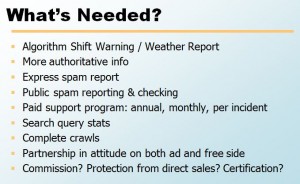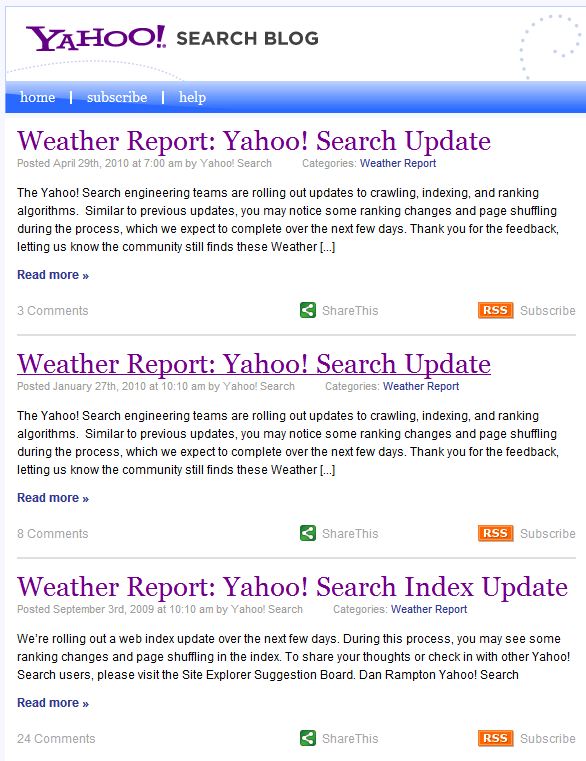They’re Back! Google Issues Weather Report For Panda Update
Google’s Matt Cutts has just issued a “weather report” about upcoming changes to be expected from Google’s Panda algorithm. If you’re not familiar with algorithmic weather reports, sit back and learn. Because they’re back, and that’s a good thing. Before There Was Panda, There Was Florida At the end of 2003, Google released what became […]
Google’s Matt Cutts has just issued a “weather report” about upcoming changes to be expected from Google’s Panda algorithm. If you’re not familiar with algorithmic weather reports, sit back and learn. Because they’re back, and that’s a good thing.
Before There Was Panda, There Was Florida
At the end of 2003, Google released what became known as its Florida Update. Now kids, if you think Panda was bad, Florida was a storm that seemingly blew the roofs off SEO homes everywhere.
It hit during the holiday shopping period. It caused confusion and havoc among many SEOs. Search engine optimization forums like Webmaster World, which gave Florida its name, lit up like crazy.
As with the Panda Update, there were plenty of people who actually did better after Florida than before. With any update, for all the losers that yell loudly about their pain, there are winners who silently smile over their fortune.
Still, there were lots of publishers that felt they’d been doing right by Google but then penalized for reasons they didn’t understand. And it came out of the blue, something they didn’t expect.
 How About Some Warning?
How About Some Warning?
As the industry cleaned up from the Florida mess, there was much discussion on how the search engines and SEOs could better work together.
While at times they can seem enemies, they are also part of the same ecosystem. Indeed, Google itself recommends that people follow SEO best practices.
I gave a keynote talk in August 2004, where I suggested a variety of ideas I’d gathered from an online discussion. One of these was from Nuttakorn Rattanachaisit, who said:
SEs should pay attention to webmaster or website owner by giving them the information when they are changing the algorithms or something which are affected to their site. Because they don’t know what happen about their site when they dropped from the listing. Sometimes it is not their fault. I see many website which has a lot of quality content but they aren’t ranked in Search engine.
I termed this a “weather report” and listed it at the top of ideas I discussed. The slide above is from my talk back then.
2005: Yahoo Issues The First Weather Report, Google Follows
On March 31, 2005, Yahoo granted my wish — and Rattanachaisit’s suggestion — by issuing its first algorithmic weather report. I got a nice call-out in Yahoo’s post, but more important, publishers across the web got a pledge that Yahoo would be keeping them updated about coming changes:
It is important to have a dialog with publishers who rely on our product to send them visitors and that these content providers provide us with valuable feedback on our search products.
So consider this our first weather report. We’re releasing a new index tonight. You should see a lot of new content in the index as well as fluctuations in the rankings of results from previous searches.
Google soon followed with its own weather reports. The first that I can track down was issued by Cutts on August 19, 2005, where he wrote:
In fact, I’ll issue a small weather report: I would not recommend using sneaky JavaScript redirects. Your domains might get rained on in the near future.
Weather Reports Die Out Toward 2010
The weather reports kept coming, in various ways, through early 2010. Here, you can see some of the many that Yahoo issued:
As for Google, weather reports continued to come unofficially through Matt’s blog, such as this one in 2006, in 2007, or a psuedo-weather report about new Toolbar PageRank coming out in 2008.
I’m not sure when the Google reports ended. Perhaps they never really have, as I know Cutts has continued to offer tons of unofficial heads-ups about various things through his blog. But certainly, I think it’s fair to say that the idea of search engines issuing regular weather reports kind of died off.
Bringing Back The Weather Reports
Perhaps good ideas always get reinvented. Two weeks ago, during the US Senate hearing about Google and competition, Senator Amy Klobuchar had one of the last questions to put to Google chairman Eric Schmidt. And what she wanted was weather reports. From my live blogging (the brackets show me exclaiming that hey, she wants weather reports!):
Klobuchar: Can you do more to explain when changes are coming [weather reports!]
Schmidt: We do some, we could do more. but if we’re completely transparent, we’d be heavily gamed by sites trying to spam us. Do believe we can do better job to describe the change.
After last week’s news about the Panda update was made official, I went back to Google and asked about bringing back the weather report concept. That’s because, despite what Schmidt said, lately Google hasn’t been issuing warnings before a change happens.
Google will confirm some updates if we or other publications ask, but this is after the fact. And we’d rather not be in the position of having to constantly be asking if Google would confirm if something that just happened was a Panda update, or another type of algorithm update or so on. Having regular official updates about updates (heh) through something like the Google Webmaster Central blog would be better.
In response, Google told me last week:
We’ve been reserving the moments to blog about changes when it’s a significant one.
Panda Weather Report Issued
That seemed pretty much like no, there aren’t going to be weather reports. But then early today, Matt Cutts tweeted:
Weather report: expect some Panda-related flux in the next few weeks, but will have less impact than previous updates (~2%).
Panda doesn’t constantly run. It’s a special algorithm that Google processes content through on a periodic basis. Why Google Panda Is More A Ranking Factor Than Algorithm Update explains much more about this.
What Cutts is saying isn’t that Panda “flux” will be happening during the next few weeks but rather to expect another Panda Update (Panda 2.6), a minor one compared to some past ones, to happen in the next few weeks.
That fits in with the regular cycle we’ve come to know, which so far has been this:
- Panda Update 1.0: Feb. 24, 2011
- Panda Update 2.0: April 11, 2011 (about 7 week gap)
- Panda Update 2.1: May 10, 2011 (about 4 week gap)
- Panda Update 2.2: June 16, 2011 (about 5 week gap)
- Panda Update 2.3: July 23, 2011 (about 5 week gap)
- Panda Update 2.4: August 12, 2011 (about 3 week gap)
- Panda Update 2.5: September 28, 2011 (about 7 week gap)
Overall, I’m encouraged. Weather reports might be making a comeback, and that’s a good thing. I’ve asked Google again about this, and I’ll update if I hear more. And Bing, if you’re listening, we want weather reports from you, too.
Postscript: I received this further update from Google:
In general, we still want to be giving weather reports or advance notice where it makes sense. It can be difficult to decide when to talk about updates or algorithm changes, not only because changes are often not very noticeable to the general populace, but because we make over 500 algorithmic changes to our rankings a year.
Contributing authors are invited to create content for Search Engine Land and are chosen for their expertise and contribution to the search community. Our contributors work under the oversight of the editorial staff and contributions are checked for quality and relevance to our readers. The opinions they express are their own.
Related stories
New on Search Engine Land

